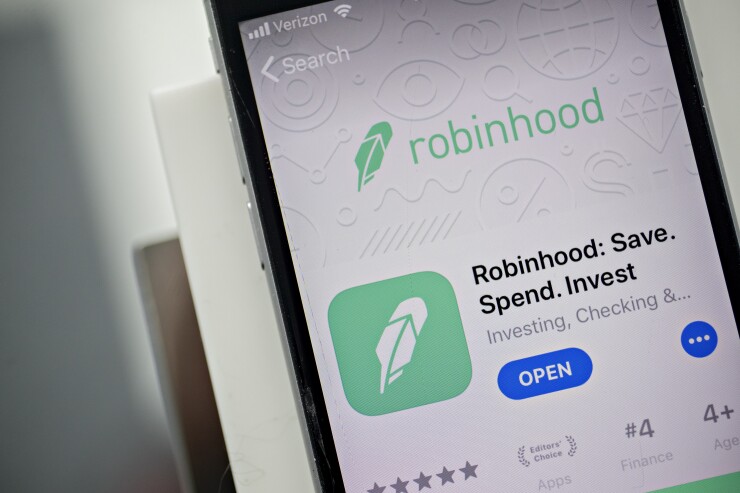Barclays is calling into question the narrative that mom-and-pop investors have played a major role in driving equities’ massive rebound.
By comparing holdings of Robinhood brokerage app users to the daily stock returns for S&P 500 companies, the Barclays analysts found that more customers moving into a stock has corresponded to lower returns, not higher. The analysis uses March 13 as a starting point, while other recent reports from firms such as Bespoke Investment Group finding the opposite conclusion have used longer time horizons.
Barclays looked at the entire S&P 500, a group that includes Amazon.com with shares trading at more than $2,500 each.
For individual stocks, they estimated the relationship between daily holding changes and daily returns, finding a negative correlation between a change in the number of Robinhood customers holding a stock and the return of that security.
-
The online brokerage says it has experienced record revenue growth during the coronavirus pandemic.
April 16 -
From digital advice to fee transparency and fintech investment, the pandemic has touched almost every corner of wealth management.
May 5 -
The company is known for helping fintechs connect to banks and wealth management firms. Now it wants to help the firms catch up.
May 19
“This analysis is not properly causal, but to us it is compelling evidence that the rally has not been driven by retail enthusiasm at brokers like Robinhood,” the analysts including Ryan Preclaw, head of investment sciences at the firm, wrote in a note Friday.
For instance, Coty has been the worst performing name in the S&P 500 since mid-March, yet the number of Robinhood accounts that hold Coty has increased sixfold.
Earlier in the week, Bespoke reached a different conclusion, by studying lower-priced shares, which are often more attractive to retail investors. They compared the average performance of Russell 3000 securities by decile of their price since Charles Schwab cut commissions to zero last October to average performance by decile of share price the year prior.
They found that the average share with a price in the bottom decile in October is up over 15% since, which “suggests small, active ‘gamblers’ are playing some role in market flows and performance as they look for ‘lottery ticket’ stocks.”
"It's now June and if you’ve been on a deserted island for the last five months you couldn’t have fathomed the movements we’ve seen," an expert says.
The role of retail investors in a 45% rebound since late March has been intensely analyzed, as a swarm of tiny buyers chased after recovery plays and insolvency stocks. A record number opened new trading accounts in the first quarter.
“The number of instances where retail investors alone can truly drive an industry’s or sector’s performance or the market’s performance is very rare,” said David Donabedian, chief investment officer of CIBC Private Wealth Management. “Pointing to retail investors as the reason for a major market trend is never the whole story.” — Additional reporting from Sarah Ponczek and Vildana Hajric.







